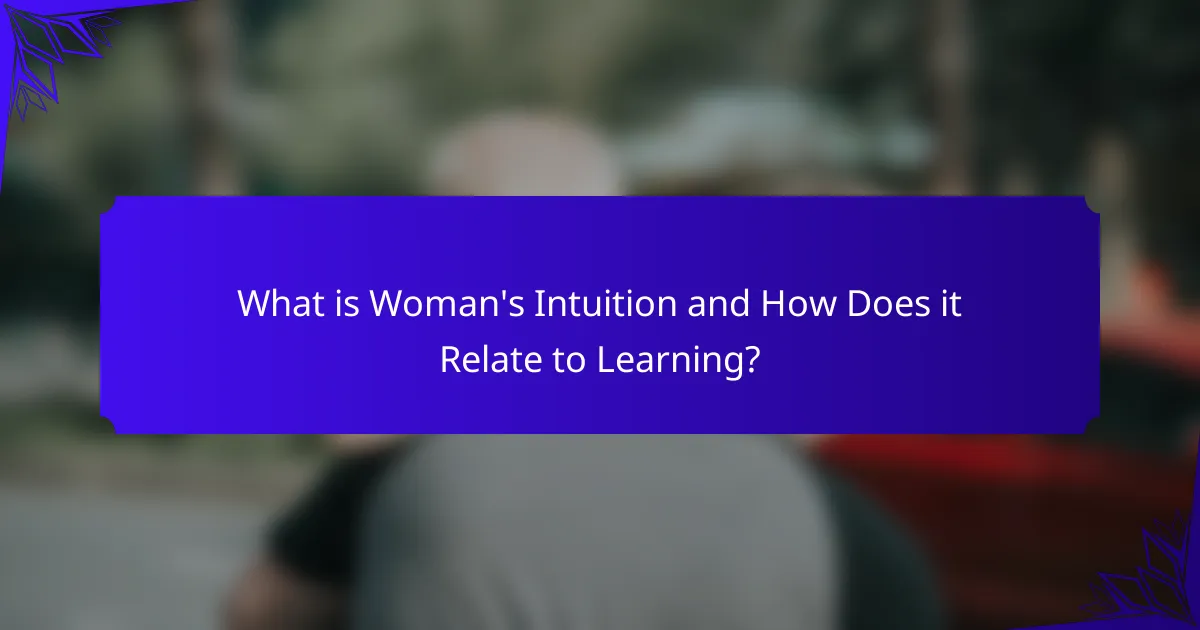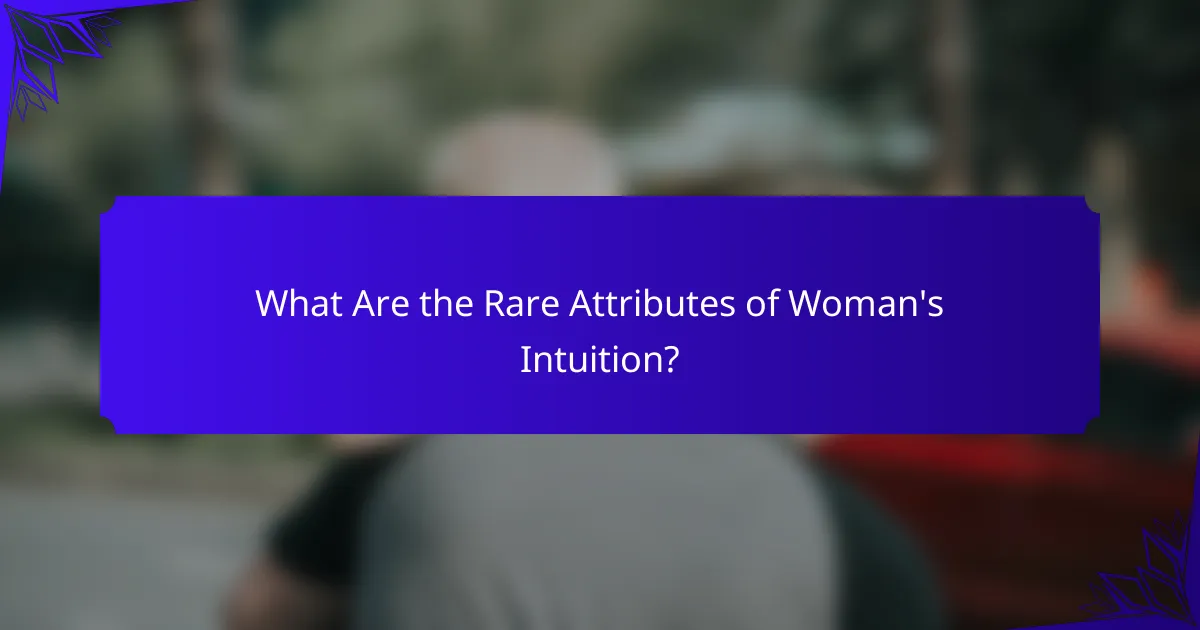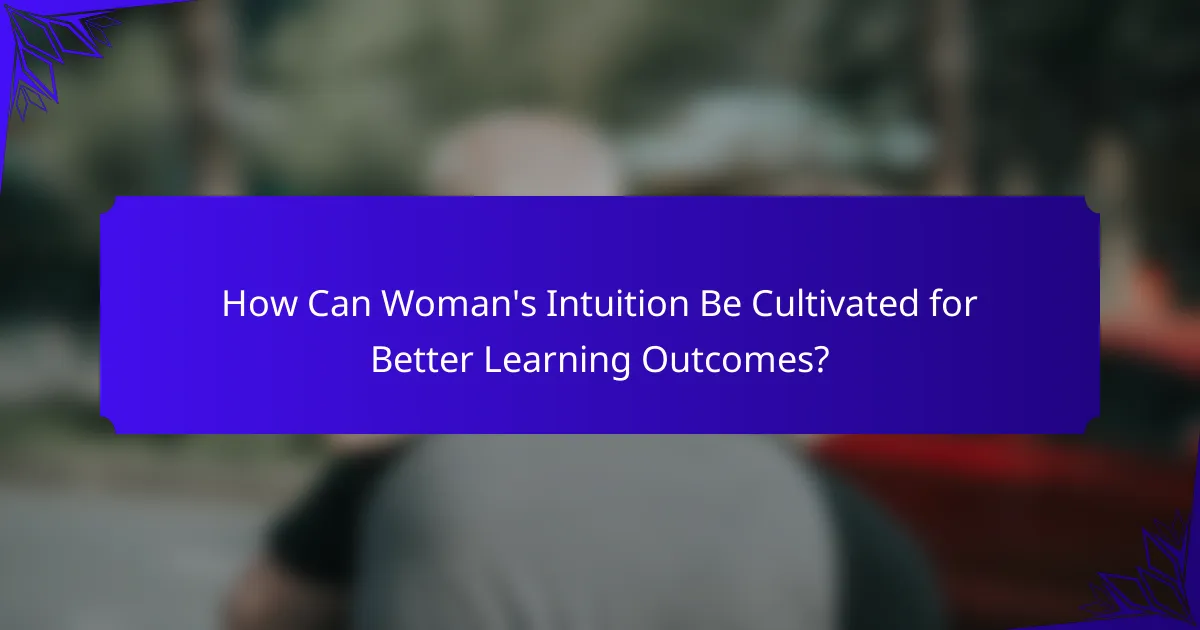Harnessing woman’s intuition can significantly enhance emotional intelligence, leading to improved learning outcomes. This article explores the key attributes of intuition, such as empathy and instinctual decision-making, and their impact on social dynamics. It also discusses techniques to cultivate these insights, including mindfulness practices and collaborative learning environments. Finally, expert insights highlight the importance of integrating emotional awareness into educational strategies for optimal outcomes.

What is Woman’s Intuition and How Does it Relate to Learning?
Woman’s intuition refers to an innate ability to understand and interpret emotional cues, enhancing learning. This form of emotional intelligence enables women to connect deeply with others, fostering collaborative environments. As a result, women often excel in social learning contexts, utilizing empathy to grasp complex concepts. Research indicates that this intuitive approach can lead to improved retention and application of knowledge. By harnessing these insights, women can effectively condition their learning strategies, adapting to diverse educational settings.
How is Emotional Intelligence Defined in the Context of Learning?
Emotional intelligence in learning refers to the ability to understand and manage emotions, enhancing the learning process. This skill allows individuals to connect with others, fostering collaboration and empathy. Effective learning is achieved when emotional intelligence is harnessed, leading to improved motivation and resilience. Research indicates that students with high emotional intelligence demonstrate better academic performance and interpersonal skills.
What Role Does Emotional Intelligence Play in Effective Conditioning?
Emotional intelligence significantly enhances effective conditioning by fostering self-awareness and empathy. These attributes enable individuals to understand their emotions and those of others, facilitating better learning experiences. Emotional intelligence promotes resilience, allowing learners to adapt to challenges and remain motivated. Moreover, it helps in creating supportive environments, which are essential for successful conditioning. By harnessing emotional intelligence, women can leverage their intuition to enhance personal growth and learning strategies.

What Are the Universal Attributes of Woman’s Intuition?
Women’s intuition encompasses innate emotional intelligence, enabling deep understanding and insight. Key universal attributes include empathy, instinctual decision-making, and heightened awareness of social dynamics. These qualities foster effective learning and conditioning, enhancing personal and professional interactions. Empathy allows women to connect with others emotionally, while instinctual decision-making aids in navigating complex situations. Heightened awareness of social dynamics helps in assessing environments and relationships accurately. Together, these attributes contribute to a nuanced approach to learning and adapting in various contexts.
How Does Intuition Influence Decision-Making in Learning Environments?
Intuition significantly enhances decision-making in learning environments by leveraging emotional intelligence. This ability allows individuals to navigate complex situations effectively, promoting deeper understanding and retention. Emotional intelligence fosters awareness of personal feelings and those of others, improving collaboration and communication. Research indicates that intuitive decision-making can lead to quicker, more effective learning outcomes, especially when emotional factors are considered. By harnessing women’s intuition, educators can create more responsive learning experiences that align with emotional and cognitive needs.
What Are the Common Emotional Intelligence Skills Beneficial for Learning?
Emotional intelligence skills beneficial for learning include self-awareness, empathy, emotional regulation, and social skills. These skills enhance understanding and communication, fostering a supportive learning environment.
Self-awareness allows learners to recognize their emotions and how they affect learning. Empathy helps in understanding others’ perspectives, promoting collaboration. Emotional regulation enables learners to manage stress and maintain focus. Social skills facilitate effective interactions, enhancing group dynamics.
Research indicates that emotional intelligence correlates with academic success, as students with higher emotional intelligence demonstrate better problem-solving abilities and resilience. Developing these skills can lead to improved learning outcomes and personal growth.

What Unique Attributes Enhance Woman’s Intuition?
Emotional awareness, empathy, and intuition are unique attributes that enhance woman’s intuition. These traits enable women to interpret emotional cues and respond effectively in various situations. Research shows that women often excel in emotional intelligence, allowing for better decision-making and interpersonal relationships. This heightened sensitivity fosters a deeper understanding of social dynamics, which is crucial in learning and conditioning contexts.
How Do Gender Differences Affect Emotional Intelligence in Learning?
Gender differences significantly impact emotional intelligence in learning, particularly through women’s intuition. Women often exhibit higher emotional awareness, enhancing their ability to connect with others and absorb information effectively. This unique attribute allows for better collaboration and communication in learning environments. Research indicates that women are generally more adept at recognizing emotional cues, which can lead to improved academic performance. As a result, harnessing this emotional intelligence can facilitate more effective learning strategies tailored to individual needs.
What Distinct Strategies Can Women Use to Harness Their Intuition?
Women can harness their intuition through mindfulness, self-reflection, and emotional awareness. Mindfulness practices enhance present-moment awareness, fostering intuitive insights. Self-reflection allows women to analyze past experiences, recognizing patterns and gut feelings. Emotional awareness helps identify and trust emotional responses, guiding decision-making. These strategies collectively strengthen emotional intelligence, facilitating effective learning and personal growth.

What Are the Rare Attributes of Woman’s Intuition?
Women’s intuition embodies unique attributes that enhance emotional intelligence and decision-making. Rare attributes include heightened empathy, instinctual understanding of social dynamics, and an innate ability to read non-verbal cues. These qualities facilitate effective learning and conditioning in interpersonal contexts.
How Can Uncommon Intuitive Insights Lead to Breakthrough Learning Moments?
Uncommon intuitive insights can significantly enhance learning by fostering deeper emotional connections. These insights allow individuals to tap into their emotional intelligence, facilitating a more effective learning environment. By recognizing and understanding emotions, learners can adapt their strategies, leading to breakthrough moments. Emotional intelligence enhances engagement, retention, and application of knowledge, ultimately transforming the learning experience.
What Are the Less Common Emotional Triggers That Influence Learning?
Less common emotional triggers that influence learning include personal narratives, sensory experiences, and social connections. These triggers can enhance engagement and retention by creating meaningful contexts. For example, personal stories can evoke empathy, making content more relatable. Sensory experiences, such as music or visuals, can stimulate emotional responses that facilitate memory. Social connections, through collaboration or discussion, can foster a supportive learning environment. By harnessing these less common triggers, individuals can improve their emotional intelligence and learning outcomes.

How Can Woman’s Intuition Be Cultivated for Better Learning Outcomes?
Cultivating woman’s intuition enhances learning outcomes by fostering emotional intelligence. This can be achieved through mindfulness practices, reflective journaling, and collaborative learning environments. These techniques promote self-awareness and empathy, which are crucial for effective interpersonal communication and problem-solving. Engaging in discussions that value diverse perspectives further strengthens intuitive insights, leading to improved academic performance and personal growth.
What Practical Techniques Can Enhance Emotional Intelligence?
To enhance emotional intelligence, practical techniques include active listening, self-reflection, and empathy exercises. Active listening fosters deeper connections and understanding. Self-reflection promotes awareness of one’s emotions and reactions. Empathy exercises, such as perspective-taking, improve interpersonal relationships. These techniques collectively strengthen a woman’s intuition in learning and conditioning.
How Can Journaling Improve Intuitive Insights?
Journaling enhances intuitive insights by fostering self-reflection and emotional awareness. This practice allows individuals to process experiences, leading to clearer understanding of emotions and instincts. Regular journaling can improve decision-making by clarifying thoughts and revealing patterns in behavior. As a result, women can harness their emotional intelligence more effectively, facilitating learning and conditioning in various aspects of life.
What Role Does Mindfulness Play in Strengthening Intuition?
Mindfulness enhances intuition by fostering emotional awareness and clarity. This practice cultivates a deeper connection to feelings, allowing women to leverage their emotional intelligence effectively. Research indicates that mindfulness can improve decision-making and problem-solving abilities, which are essential for intuitive learning. By being present, individuals can better recognize subtle cues and insights, ultimately strengthening their intuitive capabilities.
What Common Mistakes Should Be Avoided When Developing Intuition?
To develop intuition effectively, avoid overthinking, dismissing emotions, and ignoring feedback. Trusting gut feelings is essential, but relying solely on them can lead to misjudgments. Emphasize emotional intelligence by recognizing feelings and their implications. Cultivating awareness of biases and preconceived notions enhances decision-making. Engage in reflective practices to better understand intuitive responses.

What Expert Insights Can Guide the Application of Intuition in Learning?
Expert insights emphasize that harnessing a woman’s intuition enhances emotional intelligence, which is crucial for effective learning. Emotional intelligence allows individuals to recognize and manage emotions, fostering better communication and collaboration. Research indicates that women often excel in emotional awareness, enabling them to navigate complex social dynamics in educational settings. This ability to connect emotionally can lead to improved retention of information and greater adaptability in learning environments. By integrating intuitive insights into learning strategies, individuals can optimize their educational experiences and outcomes.
How Can Mentorship Enhance the Use of Emotional Intelligence in Learning?
Mentorship enhances emotional intelligence in learning by fostering self-awareness and empathy. Through guidance, mentors help individuals recognize their emotional responses, improving interpersonal skills. This relationship allows for constructive feedback, promoting resilience and adaptability in learning environments. Research shows that emotionally intelligent learners are more engaged and perform better academically.
What Best Practices Should Be Followed for Effective Learning and Conditioning?
To effectively harness emotional intelligence for learning and conditioning, follow these best practices: prioritize self-awareness, cultivate empathy, practice active listening, and engage in reflective learning. Self-awareness enhances understanding of one’s emotions, while empathy fosters connections with others. Active listening improves communication, and reflective learning encourages continuous growth. These practices collectively support effective emotional intelligence utilization.


